US Carries Out Two Airstrikes On Iranian Targets In Syria
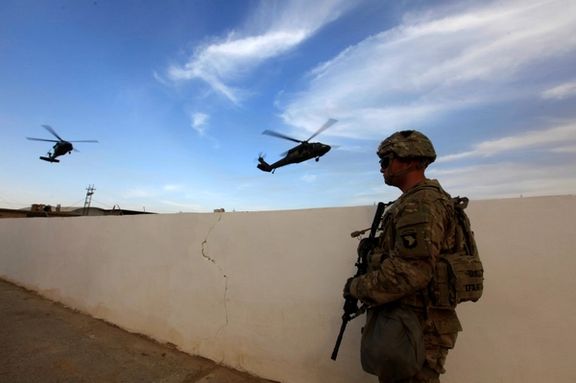
The United States carried out two air strikes in Syria against Iranian targets on Sunday, as a response to a series of attacks against American forces in Syria and Iraq.

The United States carried out two air strikes in Syria against Iranian targets on Sunday, as a response to a series of attacks against American forces in Syria and Iraq.
Defense Secretary Lloyd Austin announcing the strikes said Iran’s Revolutionary Guard and affiliated militia groups were targeted.
Since the Hamas terror attack on Israel, Iranian proxy groups began targeting US bases in the region. More than 40 drone and rocket attacks were launched injuring dozens of American servicemen. Washington twice launched retaliatory attacks, but apparently neither Tehran nor its affiliated forces were deterred.
Austin said the strikes were conducted against a training facility and a safe house near the cities of Abu Kamal an Mayadin in eastern Syria, where the IRGC has a strong foothold, helping move weapons into Syria and Lebanon.
A US defense officials told Reuters on condition of anonymity that one of the targets was a weapons storage facility. The other was a "command and control" facility, which would suggest a headquarters or other staffed structure.
The official said the strikes took place around midnight local time and a US review was underway to determine whether the strikes killed or wounded any Iran-aligned militia members.
Al-Harir Airbase, located near Erbil and housing US and international forces, was targeted in an armed drone attack, as reported by a security source on Saturday.
US and international forces stationed in Iraq and Syria have heightened their alert status following numerous attacks on their bases since the October 7 terror attack on Israel.
Iran's proxies resumed rocket and drone attacks on US bases in Syria and Iraq, breaking more than a year of relative calm.
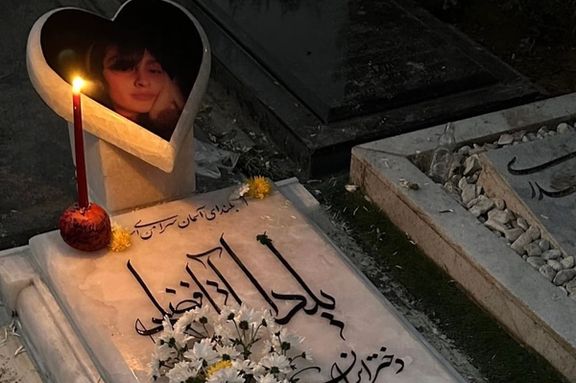
Iranian Security forces are reportedly pressuring families of those killed during protests to cancel their plans for public and even private anniversary ceremonies.
The family of Yalda Agha-Afzali, a young girl who died in suspicious circumstances at her home on November 11 last year in Tehran, five days after being released from prison, are among the families who have cancelled their plans for both private and public ceremonies without any explanation.
Mehrdad Agha-Afzali, Yalda’s father, in an Instagram post Thursday announced that all plans to commemorate her daughter on Friday as previously announced were canceled.
According to social media reports, security forces on Friday denied access, including to her family, to the section of the cemetery where the young girl is buried. A few members of the family and some supporters only managed to visit the grave after nightfall and light candles for her when security forces left.
The 19-year-old, who was arrested during protests in Tehran on October 26, went on a hunger strike at the notorious Qarchak Prison and was freed on November 6. She said she was proud she had not surrendered to pressures to accept any wrongdoing or regret for participating in protests despite having been beaten up.
After her death, authorities claimed the cause of death had been “meta-amphetamine overdose”. She was buried at Tehran’s Behesht-e Zahra Cemetery under very heavy security measures the next day.
An audio file of her conversation with a friend after her release from prison emerged on social media later -- in which she happily said she was proud she had not broken under pressure in prison – gave rise to suspicions over authorities’ explanation of her death or suicide.
The family have been under great pressure since her death by intelligence agencies. Unknown individuals vandalized her grave several times and broke her engraved stone image above it.
At least four other imprisoned young protesters – Maryam Arvin in Sirjan, Arshia Emamgholizadeh in Jolfa, Mina Yaghoubi in Arak, and Abbas Mansouri in Shoush – reportedly committed suicide within a few days after being released from prison last year.
The Pirfalak family has also been under similar pressure about holding anniversary ceremonies for their nine-year-old son, Kian, whose killing on November 15, 2022, in Izeh in southern Iran sparked nationwide outrage, earning the regime the title “child-killer”.
They were forced to hold the ceremony, under tight security measures last week, a week before the actual anniversary. Security forces prevented many who tried to attend by blocking the road.
Kian’s father, has posted a video of the low-key ceremony which shows him on a wheelchair and Kian’s mother, an a number of others, wailing at his grave.
Kian was shot multiple times in the family car during a night of protests. His father, Meysam, was also seriously injured and has been confined to a wheelchair since the incident.
Kian’s mother, Zeynab (Mah-Monir) Molaei-Rad, became a national icon of resistance after making a fiery speech at her son’s burial in which she conveyed a strong message of protest against Supreme Leader Ali Khamenei, who she says was directly responsible for her son’s killing.
The defiant family’s woes became even worse when security forces shot Kian’s 18-year-old cousin Pouya Molaei-Rad on June 11 while he was trying to break their cordon in the family’s home village of Parchestan to reach Kian’s grave to commemorate his 10th birthday.
After his death, security forces had refuse to release his body for burial for days as they demanded the silence of Kian’s mother and other family members on social media.
In the past few months Kian’s mother, once very active on social media, has been silent and rarely appears in public.
Since September 2022, when widespread anti-regime protests broke out, security forces have killed well over 500 civilians and severely wounded hundreds. Many young protesters were targeted by shotgun pellets in the face and lost one or both eyes.

As Iran-backed protests continue to flame unrest in the UK, 70 lawmakers have again urged PM Rishi Sunak to list the IRGC as a terrorist organization.
The debate as to whether or not to designate Iran’s Revolutionary Guard as terrorist, like the US has done, has been a cause of bitter divide in the British parliament, as elsewhere. Iranians in the UK have also long joined the calls.
While individuals and entities related to the IRGC have been issued with sanctions from the UK and nations including Canada, the US and European Union member states, lawmakers say it does not go far enough.
According to The Telegraph, the letter has been signed by Lord Carey, the former Archbishop of Canterbury, as well as Tory grandees Sir Iain Duncan Smith, David Davis and Liam Fox and ex-head of the Army Lord Dannatt.
The group claims there is a “compelling and indisputable” case for proscribing the group to keep the UK and its citizens safe. The US proscribed the IRGC in 2019.
In a statement the group cited Scotland Yard’s claims that Iran has made at least 15 attempts since the start of 2022 to kidnap or even kill British or UK-based “enemies”. Additionally, they pointed out that Ken McCallum, the director general of MI5, has also warned that Tehran is a direct threat to the UK “through its aggressive intelligence services”.
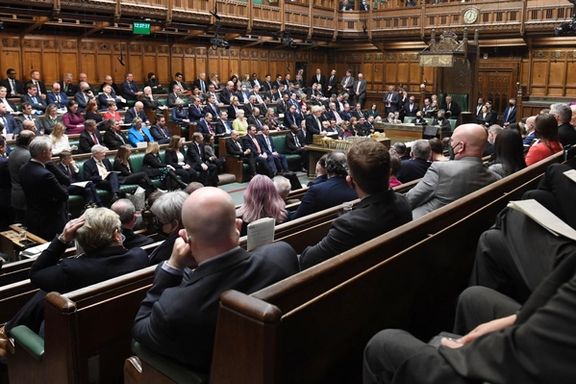
An investigation in The Times revealed that British officials have identified more than half a dozen UK-based groups with direct ties to Tehran amid fears the hostile state is stirring up tension over the conflict in Israel.
The anti-Israel protests have stirred bitter debate in the UK where police have allowed the hundreds of thousands strong protests to continue, while containing more nationalist counter demonstrators.
Suella Braverman, the home secretary, last week accused London’s Met Police of showing bias when it came to demonstrations and of favouring left-wing causes and what she called pro-Palestinian “mobs”, many openly supporting Hamas with little legal ramifications.
The statement from the MPs argues that proscription would be in the interest of national security at home, as well as “peace, stability and justice” in the Middle East, where since the war broke out, Iranian proxies in Syria, Lebanon and Yemen have not only joined the war on Israel, but also attacked US facilities in Syria and Iraq.
Garnering a majority of Iran’s defense budget, since the 1979 revolution, the IRGC has become a major military, political, intelligence and economic force in the country. Its influence has spread not only across the Middle East as it supports Iran’s proxies in the region, but has since seen activity in the likes of the UK and US.
Earlier this year, Iran International’s UK offices were forced to temporarily relocate to Washington after national security agency MI5 said it could no longer protect the team who were under threat from IRGC agents.
In the US, it has also carried out numerous attempted attacks, not least to avenge the assassination of Quds Force Commander, Qassem Soleimani, killed by the US in 2020 under the Trump administration.
The Telegraph reported that in their statement, the parliamentarians argue that the group’s role in providing terrorists with weapons, training and financial support, as well as “fomenting violence and conflict” in the region, is “undeniable”.
“Their actions have exacerbated conflicts and hindered the path to peace,” they said.
“We strongly believe that the proscription of the IRGC is not only a global necessity, but also in the interests of our own national security.”
Foreign Secretary James Cleverly has been reluctant to proscribe the IRGC in the face of increasing calls, not least since the Hamas terror attack on October 7. Iran funds its biggest Palestinian proxy at least $100m a year and supports it with arms, training and technical support.
In the months leading up to the attacks, Iranian leaders had top level meetings with Hamas and Hezbollah chiefs, signalling complicity in the attacks which were the single most deadly day for Jews since the Holocaust.
The British Prime Minister has since come under further pressure to designate the group since the war in Israel. Iranian proxies have become ever more activated, showing the potential threat the IRGC poses not only in the Middle East, but globally.
The parliamentarians’ statement concluded: “We call upon our Government to recognise the urgency of proscribing the IRGC as a terrorist organisation and proceed to do so. Such a decision would constitute a significant step towards peace, stability, and justice in the Middle East and beyond.”
In response to the letter, the UK government spokesman told The Telegraph: “We continue to take strong action against Iran while they threaten people in the UK and around the world. The UK has sanctioned more than 350 Iranian individuals and entities, including the Islamic Revolutionary Guards Corps in its entirety.
“Whilst the Government keeps the list of proscribed organisations under review, we do not comment on whether a specific organisation is or is not being considered for proscription.”
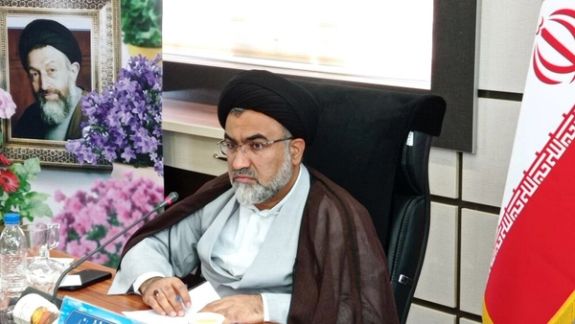
A top Iranian judiciary official has stirred controversy by alleging the involvement of an "organized network" using artificial intelligence to create disruptions in the currency market.
Abdolmehdi Mousavi, the head of Markazi province judiciary, claimed the network, comprising both Iranians and people based outside the country, “leveraged AI to orchestrate fictitious pricing and futures trading of gold and currency through the deployment of robots and the establishment of Telegram channels, all without actual physical exchanges.”
However, Mousavi's claim lacks detailed explanations on how AI could impact the exchange market, leading to skepticism and questioning the credibility of the assertion.
This is not the first instance of the Iranian government attributing currency fluctuations to speculators, resorting to drastic measures, including arrests and executions. Notably, in 2018, two men, including Vahid Mazloumin, dubbed the 'Sultan of Coins' and allegedly found with two tons of gold coins, were executed for illegal currency transactions.
The Iranian government's persistent efforts to control the currency market highlight its desperation to bolster the Iranian rial. Since the United States withdrew from the JCPOA nuclear accord in 2018 and imposed sanctions, the Iranian rial has undergone a 12-fold devaluation.
The devaluation has further compounded the already high inflation rate, prompting more Iranians to seek alternative currencies for their savings.
Despite the government's continued attempts to control the exchange market, the Iranian rial faces ongoing challenges. Currently trading at nearly 510,000 to the US dollar, the currency's value has sharply declined from around 250,000 rials per dollar just one year ago.
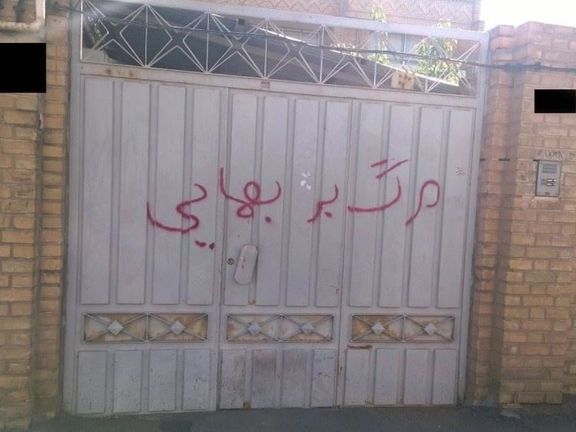
Armed Iranian security agents raided the homes of at least 30 Baha'is in the cities of Karaj and Hamedan this week, with at least 20 taken into custody.
From Iran International reports, the members of the minority group, one of the most persecuted in Iran, endured verbal abuse and physical assault during the raids.
Last month, another ten Baha'is, all women, were arrested in Esfahan (Isfahan), while 26 others faced severe sentences totaling 126 years in prison. A disturbing trend has seen at least 32 individuals detained across various cities in the country in the past month.
Homes housing five elderly women aged between 70 and 90 in Hamedan were subjected to raids. One of these women, grappling with Alzheimer's disease, was rushed to the ICU in distress following the assault. In a separate incident, the door of an 82-year-old woman's home was forcibly broken, her belongings upended, and her residence damaged in her absence.
The husbands of two of these women were among the more than 200 Baha'is executed by Iran's government in the aftermath of the 1979 Islamic Revolution. Details on charges against the detained Baha'is and their current locations remain elusive.
In September, a statement from the Baha'i community in America revealed the ongoing suppression of Baha'is in Iran. The release disclosed the detention of 60 individuals and the seizure of properties belonging to 59 other Baha'is. Despite unofficial estimates indicating the presence of over 300,000 Baha'i citizens in Iran, the country's constitution officially recognizes only Islam, Christianity, Judaism, and Zoroastrianism. The Baha'i is the largest non-Muslim religious minority, facing systematic persecution since the Islamic Revolution in 1979.
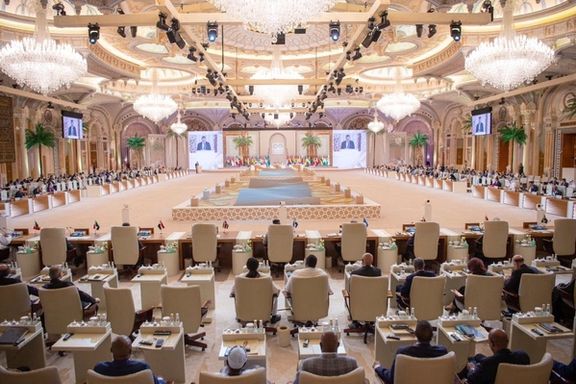
The Islamic-Arab summit in Riyadh was unanimous in slamming Israel, but the event laid bare some fundamental rifts between Iran and the Arab world on ‘Palestine.’
The joint summit of the Arab League and the Organization of Islamic Cooperation (OIC) in the Saudi capital, the biggest since the Hamas-Israel war started on October 7, took a tough tone against Israel. The final declaration on Saturday rejected Israeli claims that it is acting in "self-defense" and demanded that the United Nations Security Council adopt "a decisive and binding resolution" to halt Israel's "aggression." However, the practical measures pushed by Iran were ignored in the final communique.
Riyadh originally planned to host two separate extraordinary summits but then extended the Arab League summit to include the OIC, a wider association of 57 mostly Muslim-majority states to which the Arab League countries belong. Arab diplomats told AFP the decision to merge the meetings came after Arab League delegations failed to reach an agreement on a final statement. Iranian President Ebrahim Raisi's trip to Saudi Arabia was the first by an Islamic Republic’s head of state in more than a decade. It was enabled after Tehran and Riyadh formally ended years of hostility under a Chinese-brokered deal in March.
During the meeting, Iran pushed for punitive economic and political steps against Israel over its retaliatory offensive against Hamas but while the participants condemned Israeli forces' "barbaric" actions in Gaza, they declined to approve Tehran’s proposals, highlighting regional divisions over how to respond to the war as fears mount that it could spiral out in other countries. Common belief is that Iran, vocally opposed to warming ties between Israel and the Arab world, nudged Hamas with hundreds of millions of dollars as well as logistical support to start a war so the anti-Israeli sentiments would disrupt the peace process between Israel and the Arab world begun in 2020 with the Abraham Accords. Just weeks before the war broke out, the Saudi Crown Prince and de facto ruler, Mohammed bin Salman, admitted ties were getting ever closer between Israel and the kingdom.
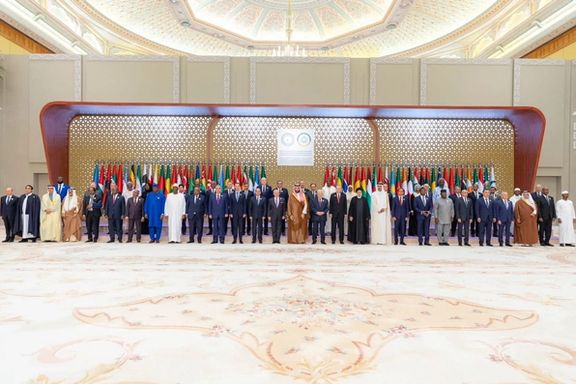
The Iran-funded militia Hamas attacked Israel on October 7 and killed 1,200 mostly civilians and took over 240 people as hostages. Israel has been pounding Hamas’s targets in Gaza for over a month now seeking to uproot the Islamist group, which has made the war exceedingly bloody, hiding deep among the civilian population and underneath the coastal sliver’s non-military facilities. The Iranian regime praised Hamas as soon as news about the attack emerged and immediately organized street celebrations. While it has refrained from direct involvement in the fighting, its Iraqi, Syrian and Yemeni proxy forces have launched more than 40 rocket and drone attacks against American forces in the region, not deterred by a large deployment of US naval forces in the region.
The leaders at the Riyadh summit called for an end to weapons sales to Israel and dismissed any future political resolution to the conflict that would keep Gaza separate from the West Bank. However, the call to cut already established ties with Israel, led by Algeria and spearheaded by Iran, was also rejected, at least by the United Arab Emirates and Bahrain, which normalized ties with Israel in 2020 under the Abraham Accords.
Another point raised by Tehran and rebuffed by Muslim leaders was on the Israeli military. Iran’s President Raisi urged Islamic nations to designate the Israeli army a "terrorist organization" for its conduct in Gaza. Israel blames Hamas for the high death toll, accusing it of using civilians as "human shields." The Hamas-run Health Ministry says over 11,000 have died so far.
Another salient difference between Iran’s stance and those of the Arab countries is the two-state solution. Arab countries insist on a solution based on the borders of June 4, 1967, with Jerusalem as its capital, but Iran insists that a Jewish state should not exist at all.
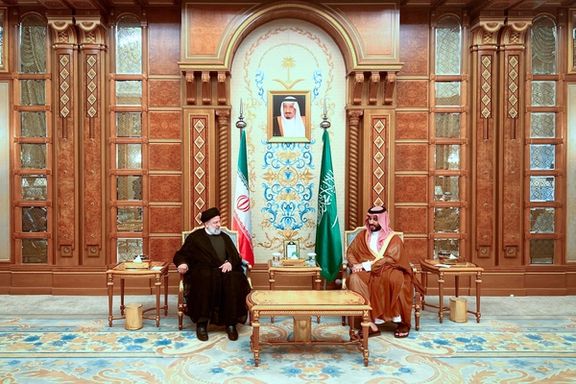
Upon arrival in Tehran, the Iranian president immediately reiterated the regime’s views and even the foreign ministry officially issued its list of “reservations” on the final statement of the summit. "These issues have also been conveyed through an official note by the Islamic Republic of Iran's representation in Jeddah to the Secretariat and will be reflected in the final report of the meeting," foreign ministry spokesman Naser Kanaani said Sunday.
The Islamic Jihad, another Iran-backed Palestinian militant group in Gaza, also issued a statement distancing themselves from the position taken by the Arab-Muslim summit. The group claimed that the final statement showed that all Arab and Islamic countries have abandoned “their duty to defend the national security of the Arab and Islamic world.”
All in all, this was the largest gathering of heads of state to sit under one roof with a common goal, ending the conflict between Israel and Palestinians. However, the question remains whether peace could even be a possibility as long as the Islamic Republic is present to sow discord and stand opposed to any diplomacy with Israel.